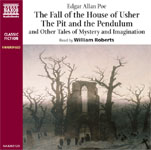
In lecture #4 of The Teaching Company’s Masterpieces of the Imaginative Mind: Literature’s Most Fantastic Works professor Eric S. Rabkin argues:
“The writing of Edgar Allan Poe has too often been dismissed for reasons that do not hold up under scrutiny. … The idea that he was an alcoholic is supported by the fact that he was found lying unconscious in an alley by a bar in his relatively young adulthood, in his 40s, and ultimately, a few days later died. In fact modern evidence that Richard Thompson at Purdue University has uncovered suggest that it is quite possible that Poe was allergic to alcohol, rather than an alcoholic. We have no evidence that he actually drank a lot. But even if he were an alcoholic claiming that his writing is nothing but the outpourings, as it were, of an alcoholic, is clearly foolish because if drinking alcohol made one a great and lasting writer the world would be full of them.
The idea that he was a pervert is based on the fact that he married his first cousin, who was only thirteen at the time, and that he never married again after her early death. It’s important to know that this first cousin, Virginia Clem, was of legal age when he married her, that marrying first cousins was not only legal but somewhat common at the time. His marriage was public, it was blessed by her mother. It was legal. It was devoted and it ended only with her death in 1847. They married in 1836, but in 1842, that is six years into the marriage, but five before her death, she was diagnosed with tuberculosis. And so for half of his marriage he lived in fear, in the knowledge, that his bride would come to an early demise. This does not sound to me like a pervert, it sounds to me like a deeply saddened man.”
On a happier note, Naxos Audiobooks, in cooperation with Audiofile magazine, are giving away an audiobook full of melancholy Poey goodness. It’s only available until midnight on October 31, 2009 (when the link will presumably turn into a 404 pumpkin) so get downloading!!
 The Fall Of The House Of Usher, The Pit And The Pendulum & Other Tales Of Mystery And Imagination
The Fall Of The House Of Usher, The Pit And The Pendulum & Other Tales Of Mystery And Imagination
By Edgar Allan Poe; Read by William Roberts
45 Zipped MP3 Files – Approx. 4 Hours 52 Minutes [UNABRIDGED]
Publisher: Naxos Audiobooks
Published: 2003
ISBN: 9789626342831
The horrors of the Spanish Inquisition, with its dungeon of death, and the overhanging gloom on the House of Usher demonstrate unforgettably the unique imagination of Edgar Allan Poe. Unerringly, he touches upon some of our greatest nightmares – premature burial, ghostly transformation and words from beyond the grave. Written in the 1840s, they have retained their power to shock and frighten even now.
Stories included:
The Pit and the Pendulum, The Tell-Tale Heart, The Masque of the Red Death, Ligeia, The Raven, The Cask of Amontillado, The Fall of the House of Usher, The Black Cat, The Premature Burial, The Facts in the Case of M. Valdemar
Posted by Jesse Willis


